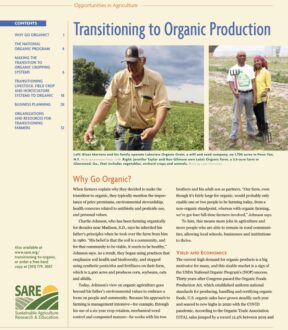USDA Resources
The National Organic Program
The USDA Agricultural Marketing Service has comprehensive information about the NOP on its website, including regulations, enforcement, the certification process and training resources.
www.ams.usda.gov/about-ams/programs-offices/national-organic-program
Sound and Sensible
The Sound and Sensible Initiative was a collaboration between USDA and 14 organizations that produced a set of resources to help make the certification process more attainable for those interested in the organic program.
www.ams.usda.gov/reports/sound-sensible
Natural Resources Conservation Service
The USDA NRCS’s portal on organic includes fact sheets, training opportunities, and technical and financial resources.
https://www.nrcs.usda.gov/organic
Farm Service Agency
The USDA FSA’s portal on organic includes financial assistance and loan programs that can support farmers who are transitioning to organic.
https://www.fsa.usda.gov/organic
Transition Resources
Tools for Transition
The Tools for Transition project includes educational modules and case studies to help guide producers through the organic transition. It was developed by the University of Minnesota, the Midwest Organic and Sustainable Education Service (MOSES), the Center for Integrated Agricultural Systems and eOrganic.
https://organictransition.umn.edu/
Rodale’s Transition to Organic course
The Transition to Organic course offered by the Rodale Institute addresses many key topics related to the organic transition, from soil and pest management to business planning, marketing and the certification process. It is available as both a self-paced online course and as a PDF guide.
https://rodaleinstitute.org/education/organic-transition-course/
Organic Transition business planner
The SARE book Organic Transition: A Business Planner for Farmers, Ranchers and Food Entrepreneurs can help you develop an actionable business transition plan that’s suitable for yourself, your management team or a lender.www.sare.org/resources/organic-transition
Organic Management Topics
eOrganic.org
This website, maintained by university researchers and Extension specialists, includes information on organic agriculture, including dairy, grain, fruit, vegetable and poultry production. The site includes articles, videos, webinars, courses and an “ask an expert” tool.
ATTRA’s organic portal
The National Center for Appropriate Technology’s ATTRA program publishes dozens of guides and videos on a wide range of topics related to organic farm and ranch management, business planning and marketing.
https://attra.ncat.org/topics/organic-certification/organic-farming/
Crop Rotation on Organic Farms: A Planning Manual
This book provides in-depth guidance on how to develop crop rotations that improve soil health and manage insect pests, diseases and weeds, with real-world sample rotations provided by experienced organic farmers. It’s most applicable to the Northeast but is useful for farmers in other parts of the country.
www.sare.org/resources/crop-rotation-on-organic-farms
Manage Weeds on Your Farm: A Guide to Ecological Strategies
This definitive book offers comprehensive information on how to manage weeds using cultural and mechanical practices instead of herbicides. It emphasizes the use of an integrated set of control strategies that exploit the weaknesses of problem weeds, and it includes a reference section that describes the identification, ecology and management of 63 of the most common and difficult-to-control weed species found in the United States.
www.sare.org/resources/manage-weeds-on-your-farm
References
Crowder, D.W. and J.P. Reganold. 2015. Financial competitiveness of organic agriculture on a global scale. Proceedings of the National Academy of Sciences of the United States of America 112(24): 7611–7616.
Delate, K., C. Cambardella, C. Chase and R. Turnbull. 2015. A Review of Long-Term Organic Comparison Trials in the U.S. Sustainable Agriculture Research 4(3): 5–14.
Lockeretz, W., G. Shearer and D.H. Kohl. 1981. Organic farming in the Corn Belt. Science 211(4482): 540–547.
Lotter, D., R. Seidel and W. Liebhardt. 2003. The performance of organic and conventional cropping systems in an extreme climate year. American Journal of Alternative Agriculture 18(3): 146–154.
Acknowledgments
This bulletin was written by Diana Friedman, with special thanks to reviewers Kristy Borrelli (SARE), Carmen Fernholz (A-Frame Organic Farm), Jermaine Hinds (SARE), Ashley Madea (Ecocert USA), Matthew Ryan (Cornell University) and Jeff Schahczenski (National Center for Appropriate Technology). It was produced by Sustainable Agriculture Research and Education (SARE), supported by the National Institute of Food and Agriculture (NIFA), U.S. Department of Agriculture under award number 2021-38640-34723. USDA is an equal opportunity employer and service provider. Any opinions, findings, conclusions or recommendations expressed in this publication are those of the author(s) and do not necessarily reflect the view of the USDA.
